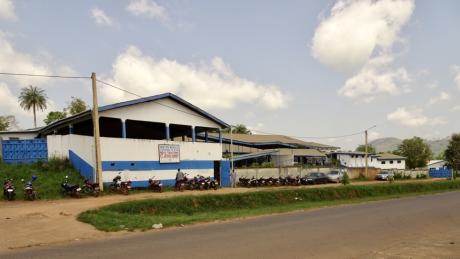
The team at an isolated medical centre share how MAF flights have assisted their own relatives during times of desperate need.
Luc Colaco Guilavogui knows what isolation does to his community in south-eastern Guinea, about a 1000km from the capital Conakry. He works as General Supervisor of Hope Clinic which provides the remote area of Nzao with essential medical services. "It's very difficult when you're sick here, most of the doctors find it difficult to come to villages. Access to health is something very difficult in these places,” Luc said.
“Also education, to study, you have to go to distances. When your children's level of education reaches an advanced stage, you have to send them to the city. Travel is really difficult and also the financial means.
“The population here lives in a very difficult situation, with a very low income because of all the manual activities that people do here.”
Luc experienced the difficulty of being so far from specialist care when his brother needed treatment, but he was grateful a MAF flight could help.
“The presence of MAF is helping us a lot here. My younger brother, he is also a laboratory technician and he works with us. But it's in our site in Diasso. He was consulted and found to have a neurological problem that was giving him a lot of pain and lower back pain,” he said.
“So he couldn't sit in a car because he can't even sit for very long and we had to send him to Conakry.
“That's how we turned to MAF. I accompanied him to the airport. He got on the plane. A few moments later, he calls me to tell me that I am in Conakry.”
A flight with MAF takes just two hours but a painful journey by road would take two days.
When MAF flies between the capital and Hope Clinic, the aircraft can bring staff, patients and vital medical equipment, such as a machine used for laboratory blood tests that needed urgent repair.
Nurse Anja Erickson and her husband Jon started the clinic and have added a nursing school to train a new generation of health workers. She says their aim is to bring healing and share the gospel.
“We want to combine the two because Jesus was doing both. He was taking care of the sick, but also preaching the gospel,” she said.
“It grew, it grew. We started with the very little. And now we started with 30 people a day, and now there's 100, 130 people come per day to the clinic.
“And then we saw we need nurses; we need to give refresher courses. So, then we thought, it may be good to start a nursing school where we can just start from scratch and teach them good techniques and all.”
Timothé Haba, head of administration at the clinic, says he got to know the work of MAF in Guinea when his sister needed help.
"Once, my older sister was sick, we had serious problems,” he said. “So it was during this time that we also learned about MAF's service. It was a very good thing, the service was able to take care of my older sister to send her to Conakry on one of its flights. This was really a relief for us.”
Story by Joel Conte